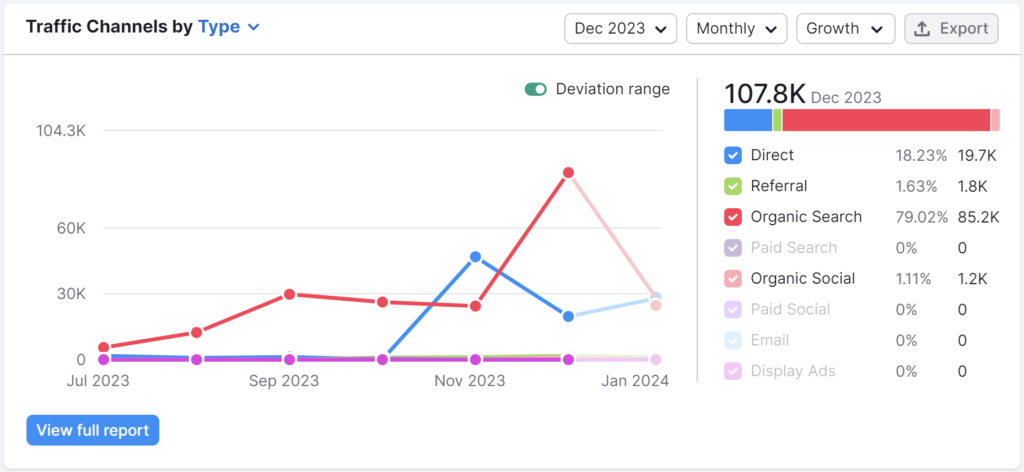Getting top-notch links can sometimes feel like a constant battle. When your competitors are using every trick in the book to outrank you in search engine results, the cost of successful link building campaigns can quickly add up.
You might be asking yourself: Why all these costs? Why can’t link building be cheap?
Well, the simple truth is that investing in quality comes with a higher price tag. Just like it is the case in every other business, working with professionals bumps up the cost to get the results you want.
Eager to learn what goes into the costs of your backlink campaign? Stick with us as we dive deep into the ins and outs of link building pricing.
- Link building is a crucial component of successful SEO strategies. While it can be time-consuming and expensive, it is necessary for improving your website’s visibility and ranking.
- The cost of link building can significantly vary, from $100 to $20,000 per month, depending on the quality of links, whether you handle the process in-house or hire professionals, and the level of attention you pay to your link building strategy.
- In-house link building can provide complete control over the process, but it requires significant effort, expertise, and expense. Hiring a professional team can be more convenient, but it is essential to consider their pricing structure and the quality of their work.
- Different methods can be used to acquire links. Guest blogging, editorial links, and offering useful tools or services are just a few examples of effective strategies. Each method contributes to a broad link profile, enhancing the overall link building strategy.
- Avoid tactics like purchasing mass low-quality links or employing black hat SEO tactics, as these can harm your site in the long run.
How Much Does Link Building Cost in 2024?
Your monthly link building expenses can be more or less equal to the amount it would take to rent a hotel room for a night. It all depends on what level of quality you expect to receive.
Generally speaking, your costs of building links will land somewhere between $100 and $20,000 per month.
That’s the quick answer. The exact amount depends on how much attention you pay to the quality of your links.
On top of that, you need to decide whether you want to try to improve your site’s ranking on your own or hire a team of professionals to do it for you.
Each approach to link building comes with a list of pros and cons to consider.
In-House vs. Agency Pricing
In the case of building links, this simple rule boils down to:
- Putting in a ton of effort and spending long hours building your links, or
- Paying out of pocket for a link building team.
The first option gives you complete control over the whole process. For instance, you don’t have to spend money on content writing or blogger outreach services. Instead, you devote time and energy to complete these tasks at your own pace.
This, of course, requires at least some level of expertise or an in-house SEO team.
The second option is much more convenient. It allows you to sit back while experts tend to the necessary link building tasks. However, you need to keep the pricing in mind.
As a website owner, your instinct might be to minimize expenses where you can, but cutting corners on backlinks could prove counterproductive.
There are several ways in which low-quality links can hurt your reputation, as well as your marketing budget. We dig deeper into this topic in our backlinks guide.
Sure, you could work with link building vendors that go way below market prices. But there’s no guarantee that the links you buy from them will drive the results you want.
If an offer seems too good to be true, it often is. At best, you will be left with no increase in rankings. At worst, you may risk your current position.
Getting quality links takes a bit more time and effort – and with it, money. Here’s a more detailed breakdown of what goes into the costs of link building.
The Cost of Link Building
According to this Ahrefs article, the average cost of a single niche edit in 2023 was $361.44. When it comes to paid guest posts, the price was marginally more affordable, coming at an average of $77.80 per piece.
Keep in mind that those numbers are approximate and should be adjusted for inflation.
Nonetheless, these are prices for only one link. They don’t include other expenses you must consider when launching a new link building campaign.
Supposing you decide to go with an in-house link building team, your expenses will most likely include the following:
Link Manager: If you aren’t an experienced link builder, you’ll have to hire someone who can provide expert advice. A link building manager can fulfill that role. If you want them to work full-time, you’ll need to spend between $30,000 and $80,000 for a US-based expert.
Content Writer/Copywriter: Another potential expense to consider is the cost of creating engaging and well-researched content. According to Glassdoor, the pay for a content writer in the United States typically ranges between $49,000 and $79,000 per year, depending on their experience and specialization.
Link Building Software: This seemingly innocent element can rack up your costs. Besides outreach software, you’ll need a keyword research tool, email-finding software, a link prospecting tool… You might end up spending about $500 a month on software alone.
Outreach Assistant: Reaching out to web admins, prospecting, and other outreach tasks can be very time-consuming – and you probably want someone to take care of it for you. Depending on your needs, it may cost you between $10,000 and $40,000 a year.
Overall, having your own outreach team and building links yourself will cost you approximately $160,000 annually. It’s pretty easy to say why hiring an in-house link building team is not something website owners do often.
So, Can I Go Cheaper?
The alternative is to work with an SEO agency that offers link building services. The main reason why outsourcing these tasks is a more cost-effective approach is its scalability.
An SEO agency already has the required resources and experience to build links for you. It goes without saying that the operational costs spread across multiple clients, decreasing the price significantly.
We have gone the extra mile to ensure the services we provide are the best fit for your business. Because of that, we decided to create a modular SEO solution.
Think about it as toy bricks. Just like they can be creatively combined to build a construction of your choice, each module in our SEO services can be put together and transformed into a well-structured strategy that increases your visibility brick by brick.
And what are the costs? It all boils down to your strategy – or the lack of it.
- If you have a proper SEO strategy in place and you’re only looking for someone to build links for you, you can expect them to start from around $100 per low-DR link.
- If you don’t have an SEO or link building strategy, many agencies (ours included!) offer more comprehensive packages with at least a few links in one batch or a given strategy.
The monthly costs of running a link building strategy with the help of an agency start from around $100 for low-end services to over $20,000 for higher volume and difficulty strategies spanning across a longer timeframe.
Why Should You Consider Buying Backlinks?
The answer to this question is pretty simple:
More backlinks = more traffic
Of course, this is a bit of an oversimplification, but in the grand scheme of things, the links you build increase your chances of getting traffic to your website.
The most direct way is through direct traffic generated when a reader on another webpage clicks a link that leads directly to your site.
However, you get much more traffic through organic traffic – a good backlink portfolio ranks your website higher, and as a result, your website is more likely to attract visitors.
And as the data from one of our recent case studies shows, organic traffic can make up over 75% of the overall traffic on your website.

But before you go and buy backlinks, a word of caution:
You should never buy backlinks, at least in the direct sense. In other words, if someone approaches you offering to sell a link from a specific site (or sites), you shouldn’t agree to it.
Instead, seek out agencies that help you acquire backlinks through organic methods, ensuring you adhere to Google’s guidelines.
If you’re unsure about the legitimacy of your links, please refer to our backlinks guide mentioned above.
What Factors Impact Link Cost?
The costs of the resources needed to build links are relatively easy to calculate, as they are quite predictable.
Another aspect you should consider when considering the costs of link building is your website.
Solutions that work for one site may not work for another.
While the general SEO tactics are more or less the same for most projects, applying the exact same approach to all websites is counterproductive.
Here are some crucial aspects that can drastically change how one should approach any given site:
Niche
What niche does the website operate in?
This is not just a question of what type of content it needs or who your competitors are.
Tricky niches, such as gambling, adult, and cryptocurrency, usually require more work. This is caused by two (somewhat related) reasons:
- Many websites try to avoid topics related to such niches. Getting a link to a gardening website from a lifestyle blog is much easier than a link to an online casino. The more sensitive the topic is, the more limited the opportunities are.
- Websites revolving around niche subjects such as gambling, CBD, or cryptocurrency are known for indulging in black-hat SEO practices. Not every website in these niches does it, but Google is much more vigilant about them. You need to take extra precautions when building links for a sensitive niche website.
It goes without saying that more complex topics require additional effort, which in turn increases the costs.
Content
Does the website offer valuable content? If so, it will be much easier to convince others to link to it.
If your content is not the best, you may want to review it before launching your link building campaign.
On top of that, building your links often involves blog posting – and to achieve any success in it, you also need decent content.
This is especially important after the release of Google Helpful Content Update, which sets the bar for quality content much higher than before.
Creative Flexibility
How flexible is the brand in regard to content marketing, and how is it perceived online?
To a certain extent, this is related to your niche. Some niches are more challenging to build links in than others. However, there are more reasons for that than just the ones we mentioned earlier.
Certain brands and websites develop their online presence in ways that influence the ease or difficulty of link-building efforts.
For example, a brand with a corporate tone and a strict content marketing policy may find it difficult to create engaging content that attracts backlinks compared to a brand with a more laid-back, user-engaging approach.
This creativity can also be reflected in the type of content you produce.
If you can create unique and engaging content like infographics, videos, or research studies, you’ll likely find it easier to build links than by just producing blog posts.
Brand Strength
Everyone loves to work with household names!
When your brand is highly popular, it becomes easier to build links. This is because people tend to link to brands that are well-known and trusted, recognizing their authority and credibility.
In contrast, lesser-known brands usually need to put in more effort and resources to persuade others to link to their content. But this doesn’t mean it is impossible!
Link Quality
Not all links are created equal is a saying that many link builders swear by. After all, it should come as no surprise that a link from a trusted and authoritative website will hold much more value than a link from a lesser-known website.
You need to ask yourself whether you should go with a few high-quality links from the highest-ranking websites or maybe a few more links from lower-ranking websites.
Both tactics are valid, and both can be cost-effective if done correctly – so the choice largely depends on your overall SEO goals.
The Value of Links for Your Business
Now that you’re aware of the expected costs for link building, you might be wondering why you should spend even a cent on backlinks.
After all, what value do they bring to your online business?
We’re so very glad that you asked. Links remain among the most important SEO ranking factors. They hold significant influence over search engines – they are proof of your authoritativeness and trustworthiness.
No matter what you try to accomplish online, links can help you achieve this goal.
Do you want to promote an event, share your passion with others, or make some money by selling products or services?
Acquiring backlinks from authoritative and relevant sources is an excellent first step!
Of course, random link building without a strategy doesn’t bring results. You need to plan and strategize – only then will you be able to unleash their true potential.
- building exposure,
- increasing brand awareness,
- communicating authority,
- boosting credibility,
- driving traffic to your website.
What to Consider Before Buying or Building Links
Finding a fair deal when it comes to link building pricing hinges upon having a deep understanding of your business.
Without knowing your site’s growth potential, needs, and budding threats, you may find it impossible to determine which offers suit your situation best.
Even if you use a pretty typical pricing scale for overall link building costs as a reference, it might be insufficient to determine the most suitable approach moving forward.
Should you focus on publishing guest posts or work on your internal linking? Perhaps your website needs to be reevaluated from a technical standpoint or requires a few simple tweaks to bring more traffic.
Take your time to look at your site from many angles to determine the answers to all the burning questions.
And if you need help with it, having your site audited by an SEO agency is a great starting point.
Consider the Different Types of Links
This is a little more technical, but if you’re up to building links on your own, you should know the main types of links.
As a rule of thumb, creating a broad link profile is the most optimal practice.
Here are some types of links that you should consider when designing your SEO strategy:
- Guest blogging: as we already mentioned, guest posts are the foundation of most link building activities. Guest blogging is one of the most common and generally accepted ways of acquiring backlinks, and – as proven by countless examples – it just works.
- Editorial links: these types of links are all about creating stellar content that others can link to in their articles. The more people mention your website as a source of valuable information, the more authoritative it becomes in Google’s eyes. Following the skyscraper technique can be a great way to achieve just that.
- Resource links: resource links come from sites that list helpful tools. Getting on such a list can yield a high-quality backlink if you offer a tool or service that is worth sharing there.
- Profile links: Since social media have become a powerful force in content marketing, it is wise to use them to their full potential. The amount of link juice they pass is debatable, but their impact on your traffic is undeniable.
Link Building Pricing Models
With this out of the way, let’s take a look at the common pricing models used across SEO and link building agencies.
Per-Link Pricing Model
This is the simplest method of pricing link building efforts. You pay for every link an agency (or a link building expert) gets you, regardless of its quality, source, or the means of acquiring it.
This model, however, has fallen out of favor, as sellers now have moved to the DR/DA-dependent model.
On top of that, per-link pricing very often indicates that the person offering such links doesn’t care about their quality or cannot guarantee it.
DR and DA Dependent Pricing Model
Today’s standard for individual link offers.
The DR (Domain Rating) and DA (Domain Authority) dependent pricing is an interesting variation of the per-link pricing model, in which links from sites with a high DR and DA rating are priced higher than others.
In this approach, you can approximate the outcome of acquiring specific links and scale your link building strategy.
Yet, relying on a single metric does not give you the full picture, which is why you should always look for other ways to measure link quality.
It’s also worth noting that many link farms use different techniques to increase these metrics and trick other site owners into paying them money for link placements.
Instead, you should work with professional link builders who conduct research to determine the best link building opportunities for your website.
Project/Result Dependent Pricing Model
The most common model among link building agencies.
When working on a project, the emphasis shifts from the number of links to the overall impact of the link building on your online presence and performance.
While this pricing model often involves a higher initial investment, it can provide a better return on investment if the agency can deliver on its promises.
Typically, this is a part of a larger SEO strategy in which link building is only a part of the cost.
And like above, you should be aware of the metrics that go into determining these goals. This could be anything from organic traffic improvements, better search engine rankings, increased referral traffic, or even tangible improvements in conversion rates.
Retainer Pricing Model
The retainer pricing model is typically associated with a long-term approach to SEO and link building.
At the core, this model is related to SEO maintenance. You “retain” the services of a link-building agency for an extended time, usually months or even years.
These service providers guarantee a certain number of high-quality backlinks on a regular basis and will usually provide additional services like content creation, optimization, and monitoring.
The Do’s and Don’ts of Buying Backlinks
Backlinks are a powerful tool to promote your website, increase your bottom line, and improve your brand awareness.
However, just as the links you acquire can take your site to new heights, they can make it disappear from search engines.
Following the unwritten rules of buying links is essential to stay on the safe side and enjoy the long-term benefits of link building.
Here are some of the do’s and don’ts of buying backlinks worth keeping in mind:
✔️ DO:
- Work with professionals and experts. They know what they’re doing and can provide you with invaluable insights. While it can increase your cost per link, it is a worthwhile investment since quality backlinks bring a ton of value.
- Focus on creating awesome content. Content marketing is one of the pillars of SEO. No matter what kind of links you want to build, good content will help you achieve your goals.
- Earn links from relevant and authoritative sources. The most valuable links come from the most valuable sources. Thus, you should pull no punches when looking for business partners and only aim for the best of the best.
❌ DON’T
- Overestimate. Link building, and SEO in general, is a long-term investment. Sometimes, it takes months before the first results appear, and even then, initial growth may be lower than expected.
- Purchase lots of low-quality links. Even though these links can deliver positive short-term results, they expose your site to danger and can harm your reputation. Don’t look for quick wins!
- Use black hat SEO tactics. At first glance, tactics such as cloaking, content theft, and employing hidden text might seem like simple shortcuts to increase traffic. In reality, they can only damage your ranking, as Google quickly caught on to them a long time ago.
Link Building Costs: Frequently Asked Questions
-
What exactly is link building and its significance in SEO?
Link building revolves around increasing the visibility of your website and its authoritativeness through the acquisition of links from other websites.
Despite changes in Google’s algorithms and increasing focus on content value, links remain one of the key indicators of your website’s relevance. Together with quality content, a well-structured link building strategy plays a vital role in improving your website’s search rankings.
-
How much does link building cost, and what factors contribute to it?
Link building costs can vary widely, anywhere from $100 to $20,000 per month, depending on your needs, the quality of links required, and the way you want to order them.
It’s important to note that this cost factors in all the tasks necessary to make a link exist.
For instance, content creation, securing guest post placements, and evaluating link prospects all contribute to this cost.
-
What practices form an effective link building strategy, and why should I refrain from buying links?
Building high-quality backlinks is an endeavor that can be pursued through content marketing, enhancing your site’s content, and fostering relationships with relevant external websites.
While some website owners might be enticed to sell links, it’s considered a disingenuous tactic by Google, which can damage your website’s rank and overall reputation.
-
What kind of links can I build, and why is link building beneficial?
In terms of types of links, these could be inbound (backlinks from other websites), outbound (links from your website to others), and internal links (links within your website).
By focusing on effective link building, you can turbocharge your website’s online visibility, enhance brand awareness, grow your customer base, and boost revenue.
-
How can I improve my domain authority and determine the optimal number of backlinks for my website?
Domain authority can be increased by getting valuable backlinks from high-authority websites, creating relevant, engaging, and shareable content, and optimizing your website’s structure.
It is also worth mentioning that when looking at backlinks, the key focus shouldn’t be on quantity but rather on the quality of backlinks and their relevance to your site.
This isn’t to say that you should aim for the highest quality links you can get.Sometimes getting a few more – but lower quality – links can be more cost-effective.
The Bottom Line
Link building can be a cost-effective method to boost your website’s visibility and rankings, but it is not cheap when done the right way.
Depending on your needs and the pricing model, link building costs may range from $100 for a single link to over $20,000 per month for a comprehensive strategy.
It’s also important to remember that building links is more than a numbers game. The quality of links matters more than the quantity, as buying dubious quality or irrelevant links can potentially harm your ranking and credibility.
Instead, aim for high-quality links from trusted sources and always partner with professionals for the best results.
While this may require a considerable investment upfront, and the results won’t be visible for a while, the long-term benefits in terms of increased traffic, improved ranking, and greater brand awareness make it worth it.
So, are you ready to commit to quality link-building to improve your website’s ranking and visibility?




![Google March 2024 Core Update: What we know so far? [Don’t Panic]](https://non.agency/wp-content/uploads/2024/03/google-march-2024-core-update--300x225.png)



